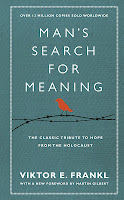 Staff Review by Chris Saliba
Staff Review by Chris Saliba Viktor E. Frankl was a neurologist and psychiatrist who also survived the Nazi concentration camps. His experiences in the camps helped him to develop logotherapy, a treatment for depression and suffering. According to Fankl the best way to achieve contentment and avoid distress is to find meaning in life, whether through art, love, religion or even the endurance of suffering.
This holocaust memoir has a deservedly huge reputation, and has sold some 12 million copies. To my embarrassment, I didn’t know anything about Man’s Search for Meaning until I was searching for self-help books for our book shop. This beautiful edition by Rider books inspired me to sit down and read it.
The book has a slightly unusual and ad hoc construction. The first 75 pages consists of Victor Frankl’s experiences in Nazi concentration camps, which was first published in 1946. Then there is a 1962 essay which describes the psychotherapeutic treatment called logotherapy. Logotherapy was created by Frankl, who was trained as a neurologist and psychiatrist. Its method of healing is for patients to find some sort of meaning in their lives. Once meaning has been established in a person’s life – whether it be through love, religion or creativity – then depression lifts. Even though these two parts of the book were written some 16 years apart, they are both complimentary.
There are some further writings in this edition (I don’t know if they appear in others) :a 1984 postscript 'The Case for a Tragic Optimism', two letters and two speeches. These additions basically elaborate further on Frankl’s logotherapy but don’t add anything substantially new. You basically just need to read the first two parts to absorb the book’s major theory.
Part One, called 'Experiences in a Concentration Camp', describes the three main psychological stages of imprisonment. Firstly there is the shock of finding yourself in such unreal and horrific circumstances as a concentration camp, with a chimney in the background issuing smoke from human bodies that have been gassed to death.
The second stage occurs when prisoners become apathetic and accept their fate, enduring all sorts of hardships. Frankl describes how people can endure all sorts of intolerable conditions when they have to. It is during this second, apathetic phase that Frankl has an epiphany of sorts. During a particularly bad time, he brings to mind a mental image of his wife. Such are the powers of imagination, his wife almost becomes a physical presence. It is during this intense moment of imagining his beloved that a bird lands nearby and stares at Frankl. This crystalised Frankl’s belief that we all need something that gives us meaning in life. What creates meaning can be love or a creative pursuit. Finally, even when experiencing the worst of circumstances, we can choose how to conduct our behaviour. When we have no choice but to suffer, we still retain the freedom to suffer nobly. This sort of suffering, where we have no choice but decide to act nobly or with dignity, can give life meaning and should be considered a personal achievement.
The final stage that the concentration camp prisoner experiences is upon liberation and is often one of bitterness and disillusionment. Firstly, when the prisoner re-enters society, people seem indifferent to his or her sufferings in the camps. They don’t fully comprehend the full horrors that the Nazis were capable of. Secondly, when prisoners were released they often found that most of their family had been murdered. Chronic depression and lonliness were the result.
If I was rich and eccentric I’d stand in the Bourke Street Mall and hand out copies of this book to passers-by. The basic concept of the book, that finding a meaning in life can alleviate one’s suffering, makes the most elemental common sense. Neither money nor fame, it seems, can bring us contentment, but only through meaning – whether we discover that meaning through art, love or religion – can we find relief from the suffering that life often imposes.
Man’s Searchfor Meaning: The Classic Tribute to Hope from the Holocaust, by Viktor E. Frankl. Published by Rider Books. ISBN: 9781846042843 RRP: $24.95
No comments:
Post a Comment